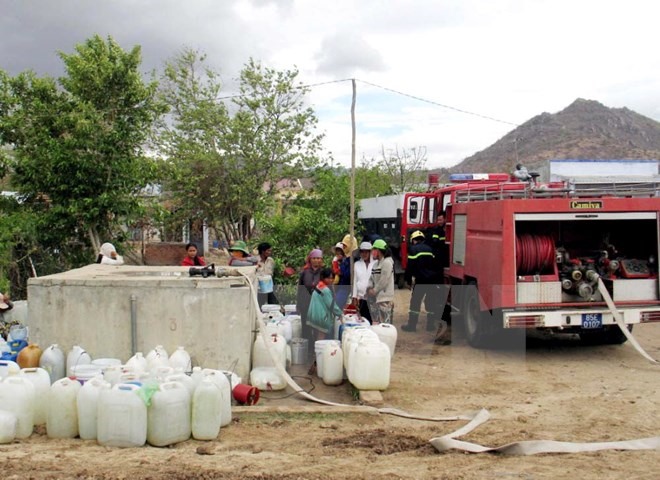 Society
Society

The United Nations Fund for Children (UNICEF) and Việt Nam Red Cross signed a co-operation agreement to improve drinking water and hygiene for areas suffering severe drought and saltwater intrusion.
 |
| Military Zone 5 High Command provides water for residents in mountainous Phước Trung Commune, Bác Ái District in the central province of Ninh Thuận during severe drought middle last year. — VNA/VNS Photo Công Thử |
HÀ NỘI — The United Nations Fund for Children (UNICEF) and Việt Nam Red Cross signed a co-operation agreement to improve drinking water and hygiene for areas suffering severe drought and saltwater intrusion.
The agreement, signed this morning, is worth VNĐ3 billion (US$125,000).
Some 30,000 people including 10,000 students and 15,000 women are expected to benefit from the assistance, which is applicable from now until next February in six provinces of Bến Tre, Bình Thuận, Ninh Thuận and Sóc Trăng, as well as Kon Tum and Gia Lai.
The assistance programme will focus on strengthening the management of rehabilitation initiatives and building resilience against droughts and saline intrusion in the project areas. It will also help strengthen human resources for community-based disaster risk management and promote communication on clean water and environmental hygiene in schools, families and communities in the area.
“Children are among the most vulnerable to the effects of climate change, which carries a potential risk to their health, so UNICEF has provided emergency support in co-operation with the government in response to the drought and salt water intrusion in Việt Nam since August 2016,” said Jesper Moller, UNICEF Deputy Representative in Việt Nam.
President of Việt Nam Red Cross Nguyễn Thị Xuân Thu said this was the first time UNICEF and the organisation had directly signed an emergency response agreement, even though UNICEF has co-operated with Việt Nam’s government since 1975.
She said she welcomed this development.
The signing of the co-operation agreement marks an important milestone in providing support to the children affected by the drought and salt water intrusion crisis, maximising the role of both organisations in facilitating an emergency response. UNICEF and the Việt Nam Red Cross will partner to deliver emergency responses across a total of 24 schools and 12 communes over the next four months, in close collaboration with their national partners and local governments.
This partnership has been made possible thanks to the generous support of the government of Japan, which made a $2.5 million contribution to UNICEF for the emergency response to improve the well-being of women and children in the affected areas. — VNS




